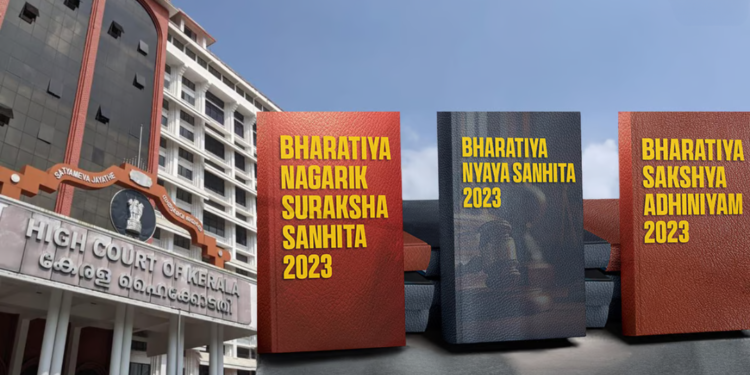On Wednesday, the Kerala High Court decided to examine whether Article 348 of the Constitution of India mandates that even the names of laws passed by Parliament must be in English, not just their texts [PV Jeevesh (Advocate) v. Union of India & Ors.].
This question arose while a Bench comprising Chief Justice AJ Desai and Justice VG Arun was considering a public interest litigation (PIL) petition challenging the Hindi names given to three new criminal laws: the Bharatiya Nyaya Sanhita, the Bharatiya Nagarik Suraksha Sanhita, and the Bharatiya Sakshya Adhiniyam.
The petitioner, advocate PV Jeevesh, contended that naming the new laws in Hindi violates Article 348, which mandates that English shall be used for all Acts and Bills passed by Parliament.
The Bench asked Jeevesh whether Article 348(1)(b) includes the names of the Acts or just their contents. “Article 348 only says that authoritative text has to be in English. Does that include the name?” Justice Arun inquired.
In response, Jeevesh argued that the dictionary definition of “authoritative” means something passed by an official authority, which would include the names of the Acts.
When the counsel for the Central government argued that the names are written in English alphabet, Jeevesh countered that only the script is English, not the language.
The Court decided that the issue requires detailed consideration and scheduled the next hearing for July 26.
In his petition, Jeevesh claimed that the Hindi names of the new laws would create confusion and difficulty for lawyers in South India and other non-Hindi-speaking regions. He argued that the names are hard to pronounce for those who do not speak Hindi or Sanskrit.
Jeevesh further contended that this violates Article 19(1)(g) of the Constitution, which guarantees the right to practice any profession or to carry on any occupation, trade, or business. He also argued that it contravenes Article 348(1)(b).
Article 348 specifies that all proceedings in the Supreme Court and High Courts, as well as all authoritative texts of Bills, laws, ordinances, orders, rules, regulations, and bye-laws, must be in English.
Jeevesh argued that this Article was intended to promote unity among diverse linguistic groups. He claimed that naming the new laws in Hindi constitutes linguistic imperialism and is autocratic, arbitrary, and contrary to democratic values and federal principles.
He has urged the High Court to direct the Central government to provide English names for the new laws. Additionally, he sought a declaration that Parliament has no authority to title any law in a language other than English.
The new criminal laws are scheduled to come into force in July.

















